The recently released Sanskrit and the Evolution of
Human Speech by Sampadananda Mishra attempts "to highlight Sri
Aurobindo’s contribution in the field of linguistics; to create an
awareness about the role of language, and of Speech as a Creative Power;
to establish the study of Sanskrit as a key to help trace the origin and
development of language".
To learn more about how this book
achieves its objective, read the review
that follows the New Publications section.
NEW PUBLICATIONS
To order any book, click on the title, which will locate
the book in our online catalogue. Next, add it to the shopping cart. You
may then proceed to pay by credit card online.
ENGLISH |
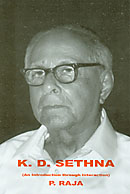 K.
D. Sethna (Amal Kiran) K.
D. Sethna (Amal Kiran)
An Introduction through
Interaction
— P. Raja
ISBN:
81-87619-08-2
Publisher: Busy Bee Books, Puducherry
Binding:
Soft Cover
Pages: 124
Price: Rs
100
In this series of interviews, K. D. Sethna, the
grand centenarian, reminisces about his childhood, a variety of
relationships, his poetry, his critical works and his inner quest.
The book brings out "the vision of a man who has encapsulated in his
hundred years the turmoil and exuberance of the 20th century."
|
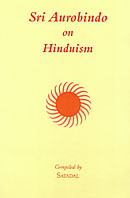 Sri
Aurobindo on Hinduism Sri
Aurobindo on Hinduism
— Compiled from the Works of Sri
Aurobindo
Publisher: Smt. Maya Chattopadhyay,
Kolkata
Binding: Soft Cover
Pages: 116
Price: Rs 50
This is a compilation on religion in general and
Indian tradition in particular. It is especially relevant in the
context of the current debate on secularism and revivalism, and the
ongoing reevaluation of the place of religion in public life.
The material is drawn from The Renaissance in
India and other Essays on Indian Culture (formerly The
Foundations of Indian Culture) as well as from Sri Aurobindo's
other cultural and philosophical writings. |
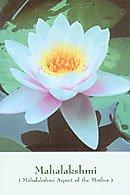 Mahalakshmi
(Mahalakshmi Aspect of the Mother) Mahalakshmi
(Mahalakshmi Aspect of the Mother)
All India Magazine booklet
— Words of Sri Aurobindo and the Mother
ISBN:
81-7060-243-2
Publisher: Sri Aurobindo Society,
Puducherry
Binding: Soft Cover
Pages: 48
Price: Rs 15
|
 Conversations
of the Dead (Mriter Kathopakathan) Conversations
of the Dead (Mriter Kathopakathan)
— Nolini Kanta Gupta
Publisher: Smt. Maya
Chattopadhyay, Kolkata
Binding: Soft Cover
Pages:
89
Price: Rs 30
Sri Aurobindo wrote five "Conversations of the
Dead" in 1909–10. Nolini Kanta Gupta translated these into Bengali,
and himself wrote thirteen similar conversations in Bengali. All
these were published as part of a book Mriter
Kathopakathan.
This booklet contains English translations of
the thirteen Bengali "Conversations" by Nolini-da. The conversations
are presented as between famous historical figures such as Akbar and
Aurangzeb, Chandragupta and Asoka, and Buddha and Lao-Tze.
|
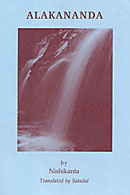 Alakananda Alakananda
— Nishikanta
Publisher: Smt. Maya
Chattopadhyay, Kolkata
Binding: Soft Cover
Pages:
78
Price: Rs 50
Nolini Kanta Gupta wrote of the mystical Bengali
poet Nishikanta, "[His] poetry is the embodiment of the Mother, Her
living image created through words."
Here is the English rendering of Nishikanta's
book of Bengali poems Alakananda. |
FRENCH |
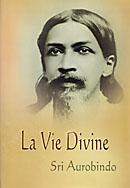 La
Vie Divine La
Vie Divine
— Sri Aurobindo
ISBN:
81-7058-784-0
Publisher: Sri Aurobindo Ashram Publication
Department, Puducherry
Binding: Hard Cover
Pages:
1153
Price: Rs 1050
“The Life Divine”: Clef de voûte de l’œuvre de Sri Aurobindo, une vue d’ensemble de
l’évolution spirituelle de l’humanité et de la transformation qui rendra possible la vie divine sur la terre.
|
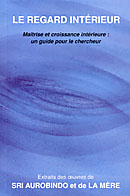 Le
regard intérieur Le
regard intérieur
Maîtrise et croissance intérieure : un guide pour
le chercheur
— Extraits des œuvres de Sri Aurobindo
et de la Mère
ISBN: 81-7058-793-X
Publisher: Sri Aurobindo
Ashram Publication Department, Puducherry
Binding: Soft
Cover
Pages: 223
Price: Rs
100
Les textes de Sri Aurobindo et de la Mère
recueillies dans ce livre par A. S. Dalal indiquent les étapes et
les moyens nécessaires pour acquérir la maîtrise et favoriser la
croissance intérieure. |
 Les
Pouvoirs intérieurs Les
Pouvoirs intérieurs
— Extraits des œuvres de Sri Aurobindo et de la
Mère
ISBN: 81-7058-799-9
Publisher: Sri Aurobindo Ashram
Publication Department, Puducherry
Binding: Soft Cover
Pages:
227
Price: Rs 110
Ces textes de Sri Aurobindo et de la Mère réunis
par A. S. Dalal traitent des différents niveaux de la conscience, du
pouvoir de la pensée, de l'imagination, de l'intuition, de la
Yoga-Shakti. |
MARATHI/SANSKRIT |
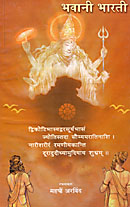 Bhavani
Bharati Bhavani
Bharati
— Sri Aurobindo
Publisher:
Vishva–Sanskrit–Pratishthanam, Vadodara
Binding: Soft
Cover
Pages: 112
Price: Rs
50
|
TAMIL |
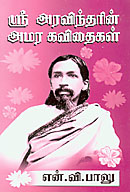 Sri
Aravindarin Amara Kavithaigal Sri
Aravindarin Amara Kavithaigal
— N.V. Balu
Publisher: Sri Aurobindo Society,
Anna Nagar Centre, Chennai
Binding: Soft Cover
Pages:
292
Price: Rs 75
|
TELUGU |
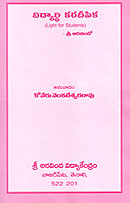 Vidyarti
Karadipika Vidyarti
Karadipika
— Sri Mataravindula Rachanala nundi Sankalanam
Publisher: Sri Aurobindo Vidya Kendram, Tenali
Binding:
Soft Cover
Pages: 103
Price: Rs
30
|
Review
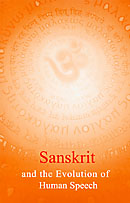 Sanskrit
and the Evolution of Human Speech Sanskrit
and the Evolution of Human Speech
Based on Sri Aurobindo's Linguistic
Theory
— Dr Sampadananda Mishra
ISBN:
81-7060-236-X
Publisher: Sri Aurobindo Institute of Research in
Social Sciences, Puducherry
Binding: Soft Cover
Pages:
171
Price: Rs 125
Brief description of content
This book presents Sri Aurobindo's views on
linguistics in general and on Sanskrit in particular. It compares
Sri Aurobindo's approach to the problem of the origin of human
speech with those of other philologists.
Sri Aurobindo has extensively studied some of
the word-families of Sanskrit to find out the original
mind-impressions that the root-sounds have within them. Discovering
these, he shows how Sanskrit has preserved the original primitive
structure of language and the system of simple root-sounds.
Some original writings of Sri Aurobindo on the
subject are included.
Contents:
I. Study of Language and Sri
Aurobindo
II. The Origin and Development of Language: Sri
Aurobindo's Theory
III. Growth of Language from
Seed-sounds
IV. The Creative Word: A New Approach to the Study of
Language
V. A True Interpretation of the Vedas: Need for a New
Science of Language |
Can you imagine a world without language? Without speech?
Yet both language and speech are “so familiar a feature of
daily life that one rarely pauses to observe the significance of it” says
the author, Dr Sampadananda Mishra, in the introduction to his book
Sanskrit and the Evolution of Human Speech. A reputed American
scholar Vyas Houston once said, “Of all the discoveries that have occurred
and developed in the course of human history, language is the most
significant.” Then more emphatically, “Without language, civilization
could obviously not exist.”
From ancient times scholars and philosophers the world over
have attempted to arrive at a science of language, to understand its
evolution and processes. Records show that the discovery of Sanskrit in
Europe gave a new impetus and direction to the study of language. Indian
scholars and grammarians had for centuries recognized the potential of
Sanskrit as a means to unravel the mystery of the formation of language.
This book is a tribute to Sri Aurobindo as a linguist
par excellence. It seeks to bring forth his yet unrecognized
contribution in the evolving field of linguistics. Sri Aurobindo declared
categorically, “my subject … is the origin, growth and development of
human language as it is shown to us by the embryology of the language
ordinarily called Sanskrit … I base my conclusions on the evidence of the
Sanskrit language helped out by those parts of the Greek, Latin and Tamil
tongues which are cognate to the word-families of Sanskrit, and by the
origins of Aryan speech I mean, properly, the origin of human speech as
used and developed by those who fashioned these word-families and their
stocks and off-shoots.”
The book is divided into seven parts. The first chapter
outlines the development of language as traced by various scholars through
the centuries. It ends with Sri Aurobindo’s analysis of the arbitrary and
conjectural nature of comparative philology and his questioning of bold
claims to establish it as an authoritative science. In the second, the
reader is introduced to contemporary theories of the origin of language,
with special reference to Sri Aurobindo’s research on the Origins of
Aryan Speech and the methodology applied by him for its study.
According to him the letters of the Sanskrit alphabet are used as
seed-sounds which combine to form primitive root-sounds, based on which
language is said to have evolved. The third chapter deals with Sri
Aurobindo’s views on Sanskrit as the key to understanding the evolution of
language. Here he elaborates on the role of the Sanskrit alphabet, its
relation to root-meanings and gives a few examples to illustrate his
point.
While the third chapter deals with the etymological aspects
of Sanskrit, the fourth tries to explain the phenomenon of human speech,
vak. It discusses the different theories of the nature of speech
that have been formulated in Indian tradition. The author talks about the
important Indian concept of the four grades of speech, para, pasyanti,
madhyama and vaikhari, and their corresponding psychological
states, thus tracing its development in man’s consciousness from its
inception to its expression. He then puts forth Sri Aurobindo’s approach
to language as being much more than a mere tool for communication. In
keeping with the Vedic vision, Sri Aurobindo speaks about the Word as
being a Creative Power.
The final chapter is dedicated to a deeper study of the
primitive structure of Vedic Sanskrit from Sri Aurobindo’s perspective and
of the formation of its archaic words. It explains the need to attribute
to key words their intrinsic psycho-spiritual sense in order to enable one
to grasp the true purport of the symbolic texts.
The conclusion starts with a brief introduction to Sri
Aurobindo’s linguistic background followed by a summary of the salient
points of the book. The final part comprises of Sri Aurobindo’s own
articles thus providing the readers an opportunity to read him in the
original.
The book has been successful in its three prime objectives:
to highlight Sri Aurobindo’s contribution in the field of linguistics; to
create an awareness about the role of language, and of Speech as a
Creative Power; to establish the study of Sanskrit as a key to help trace
the origin and development of language.
At the outset, Dr Mishra humbly confesses his inability to
present a more complete study of the subject but his book has done full
justice to the topic within its limited scope. Abounding in references, it
is proof of his extensive research in this field. At times a little
technical, the book is still very readable for an amateur in this field.
It can also serve as a useful resource for anyone who seeks to have a
deeper insight into the fascinating phenomenon of human language and
speech.
— Anuradha Choudry
Anuradha, a former student of the Sri Aurobindo
International Centre of Education, is currently doing her Ph.D. on the
Vedas as texts of applied psychology. She is also a freelance teacher of
spoken Sanskrit with Samskrita Bharathi, a popular movement to promote the
language.
You have received this as a subscriber to SABDA eNews. To
unsubscribe or change your subscription options, click here.
To view previous issues of SABDA eNews, visit our Newsletters
page.
----------------------------------------------------------
SABDA
SRI AUROBINDO ASHRAM
PUDUCHERRY 605 002
INDIA
Tel.: +91 413 2223328, 2233656
Fax: +91 413 2223328
Email: mail@sabda.in
Web: http://www.sabda.in
New releases: http://www.sabda.in/new.php
SABDA eNews mailing list: http://www.sabda.in/eNews.php
----------------------------------------------------------













